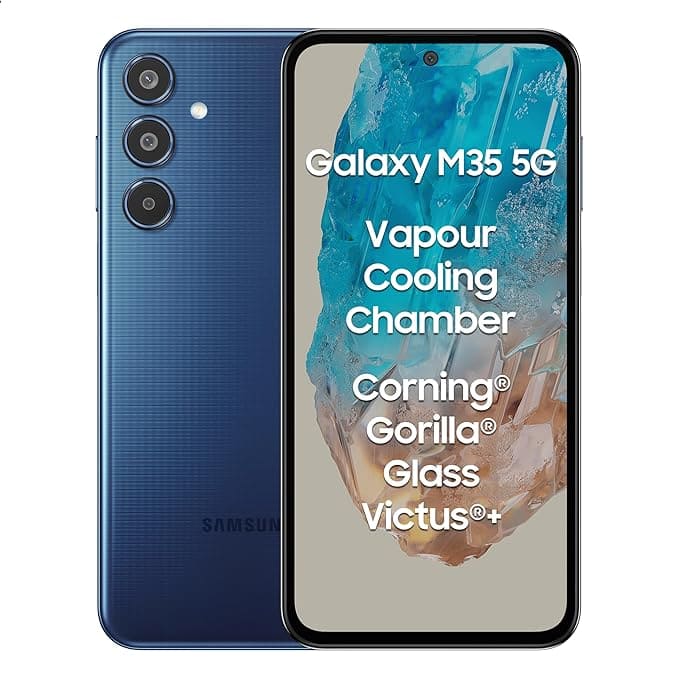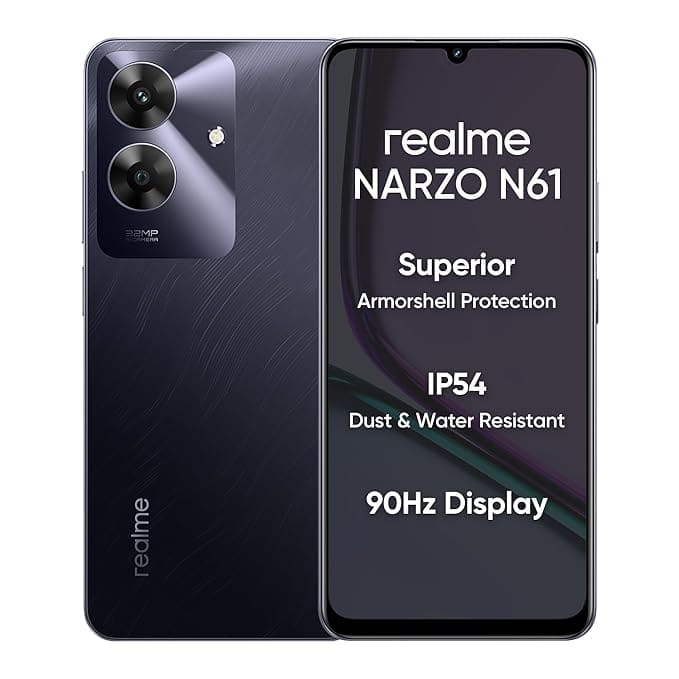English : Term 2 Unit 2 : Savings
UNIT 2
Savings
I always save my pocket money. Do you?
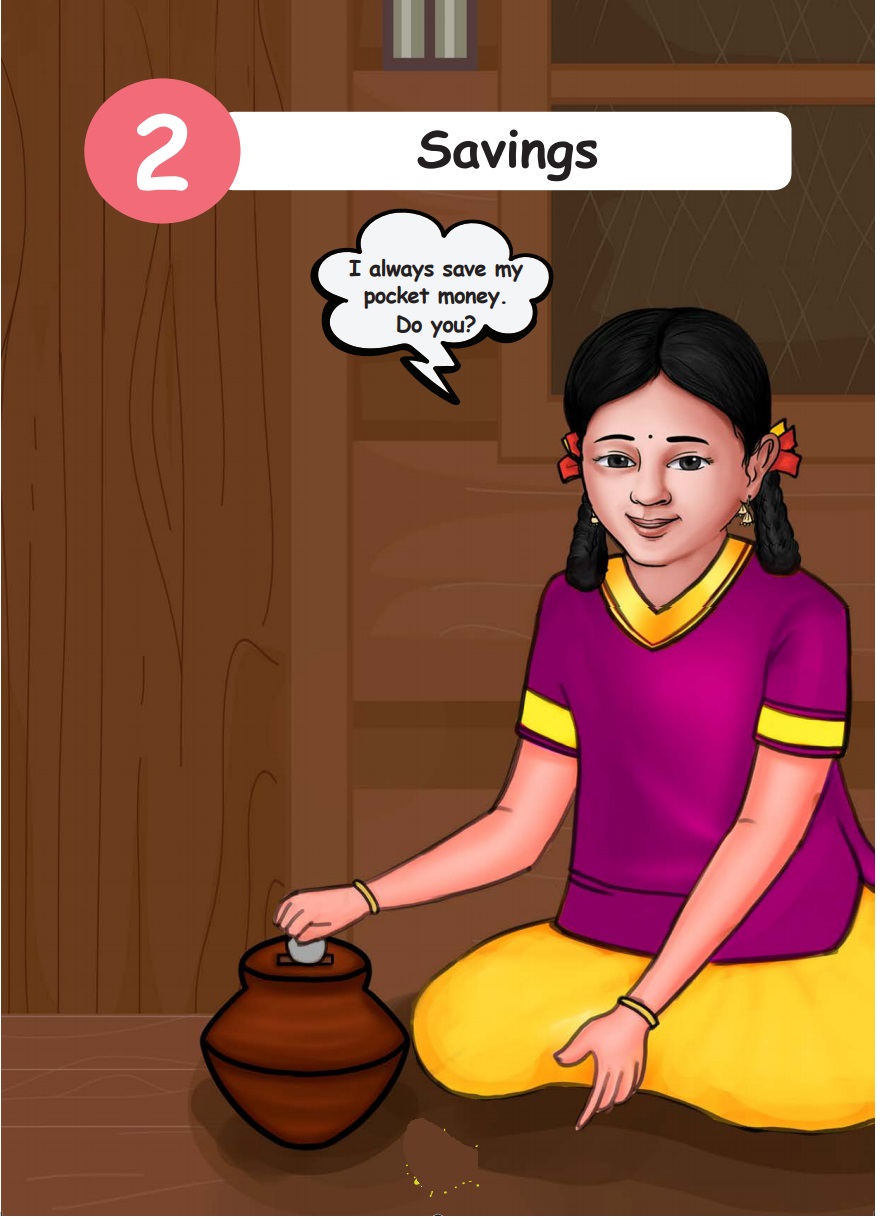
MY LITTLE PICTIONARY
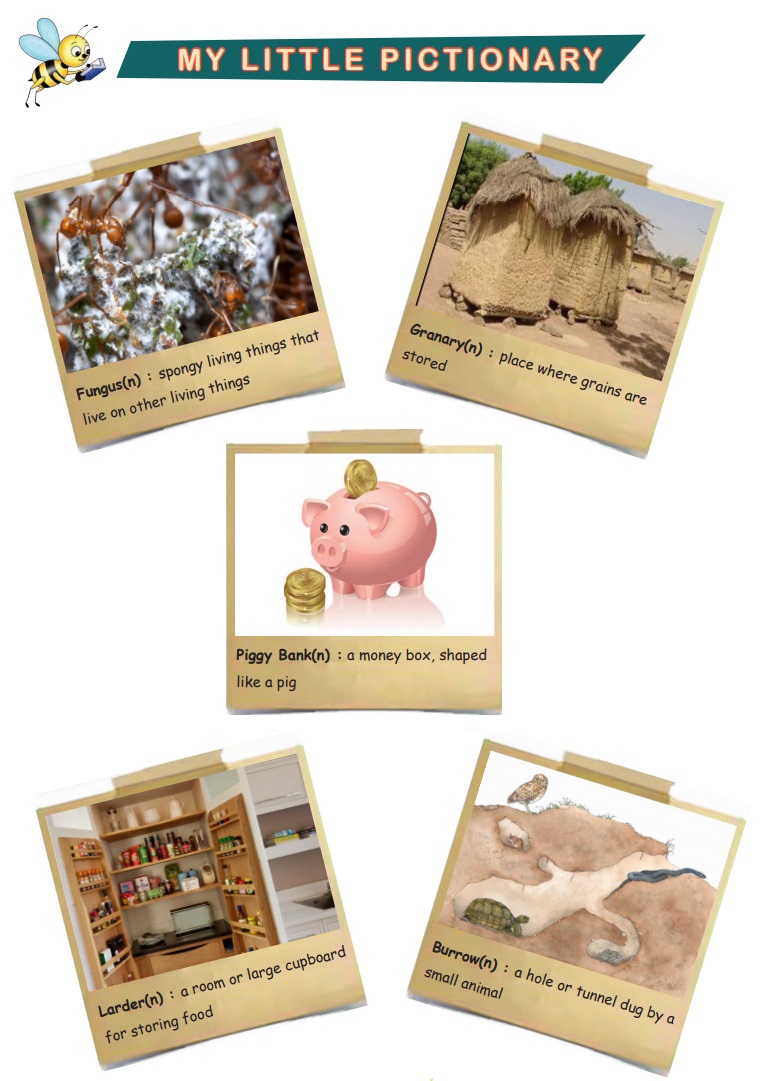
LET US LEARN
A Lesson to save
On the way to the playground, in the fields, Amir saw dirt thrown out of a pit on the ground. He went near it and saw a small rat-like creature. He called out, “Hey! Who are you? What are you doing in there?”
The creature came out and took a glance at the boy and said “I am a mole. I am digging a burrow to catch the earthworms and save them for the winter.”
“Interesting, how do you catch and save them?”
The mole replied, “I dig ‘worm traps’ along the tunnels, when the earthworms cross it they fall into it. I will bite and paralyze them and store in the tunnel to eat later.”
The boy asked, “How many earthworms will you store?”
The mole replied, “As many worms as I can get. I don‛t eat all of them. I save them for using later. Now, I don‛t have any time to waste. I must build a lot of worm traps. See you later.” The mole went inside the burrow.
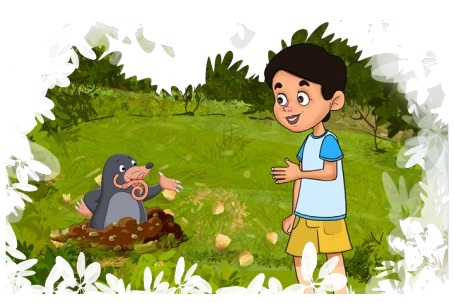
Just then, near the mole’s burrow, Amir saw a leaf moving. He went near it and saw a small ant. The ant was carrying a big leaf.
The ant yelled, “Get out of my way. It will take too long to go around your feet.”
He asked the ant “Hey! Why are you carrying this big leaf? Isn’t it easy to eat it and then go home?”
The ant dropped the leaf and replied, “I am a ‘leafcutter ant‛. I am collecting leaves for my colony. I can carry leaves that weigh nearly twenty times my weight.” Amir was surprised. He asked, “Do you eat leaves?”
The ant replied, “No, we don‛t eat leaves! We drink the leaf sap. We also use the leaves to grow fungus. We need the fungus to feed our babies. We also store the leaves for the winter.”
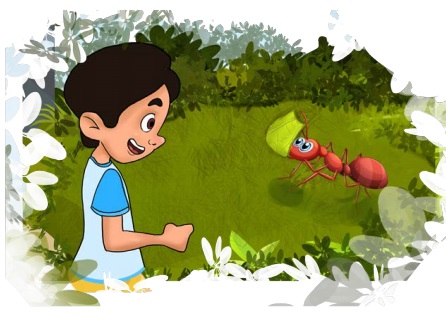
The ant asked, “By the way, do you, the humans save the food that you need?” Amir replied, “Yes we also save food in granaries, but we need money to buy it, so we usually give importance to save money. What else do we have to save?” “Don‛t you have anything other than money to save?”, asked the ant. After taking some time to think. Amir answered, “My mom asks me to save water, food, electricity, forest and fuel. We have a lot of things to save, to make sure that future generations can use these.” This interaction with the mole and the ant changed the way Amir thought about the things around him. Earlier, he let the fan run as he left the room. He let the water drip as he never closed the tap tightly. Now, he always care and save the resources around him.
THINK : Which of these is the most important thing to save, food, water, electricity or money? Why? Discuss.
Glossary
digging: break up and move earth
traps: enclosure designed to catch and retain animals
Paralyze: incapable of movement
Sap: plant fluid
LET US UNDERSTAND
A. Say whether the statements are True or False.
1. Amir left the tap opened earlier. (TRUE)
2. Amir switched off the fan when he walked out. (FALSE)
3. Moles trap worms and store them. (TRUE)
4. Leafcutter ants grow fungus. (TRUE)
5. Amir realised his mistakes. (TRUE)
B. Choose the correct option.
1. Moles dig ___________ to catch worms.
a. worm trap
b. tunnel
c. burrows
Answer: b. tunnel
2. Leafcutter ants can carry leaves that weigh _______ times of their body weight.
a. two
b. twenty
c. thirty
Answer: b. twenty
3. Moles bite and ___________ the worms.
a. eat
b. store
c. paralyze
Answer: c. paralyze
4. Leafcutter ants drink ___________.
a. leaf sap
b. honey
c. dew
Answer: a. leaf sap
5. Humans give importance to save ___________.
a. food
b. money
c. water
Answer: b. money
C. Answer the questions.
1. Why should we close the tap after using it?
Water is a natural resource. We should not waste it. We should save it for the future generation. So we should close the tap after using it.
2. Where do the moles save their food?
The moles save their food in the tunnels.
3. Why do the leafcutter ants grow the fungus?
The leafcutter ants grow the fungus to feed their babies with it.
4. List the things that humans should save.
We should save water, food, electricity, forest and fuel.
5. What are things that we can save? Why should we save them?
We can save water, food, electricity, forest and fuel. Once we use them up they become exhausted. We cannot make them again easily. So we should save them for the future generations.
LET US BUILD
Hi friends, I am here to show my magic tricks.
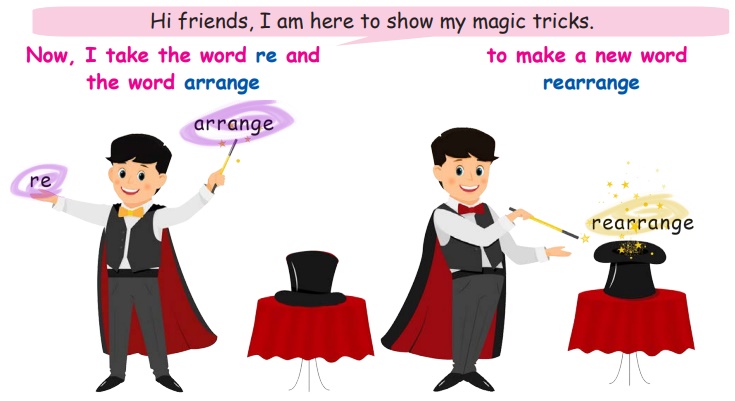
Let us see how to use un, re, dis, and pre.

Like this we can join many words together to form new words.
A prefix is a letter combination that is fixed at the beginning of the word. The prefixes add new meaning to the word.


un: unwanted unfortunate
re : rewrite repaint
dis: dislike dispose
pre: prepaid preschool
A. Match the following and write the new word.
1. pre – continue discontinue.
2. dis – familiar unfamiliar.
3. un – open reopen.
4. re – view preview.
B. Tick (✔) the correct prefix and write the new word.
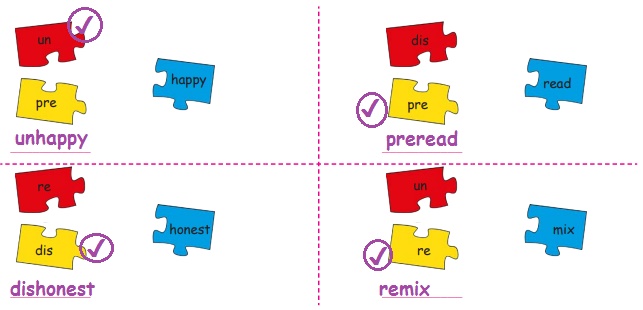
C. Add a prefix to each word so it matches the new definitions.
Prefix: un, re, dis, pre
word: lucky, check, view, approve
1. Make sure the things are correct recheck.
2. A person who got no luck unlucky.
3. Do not approve disapprove.
4. A chance to view before preview.
LET US SING
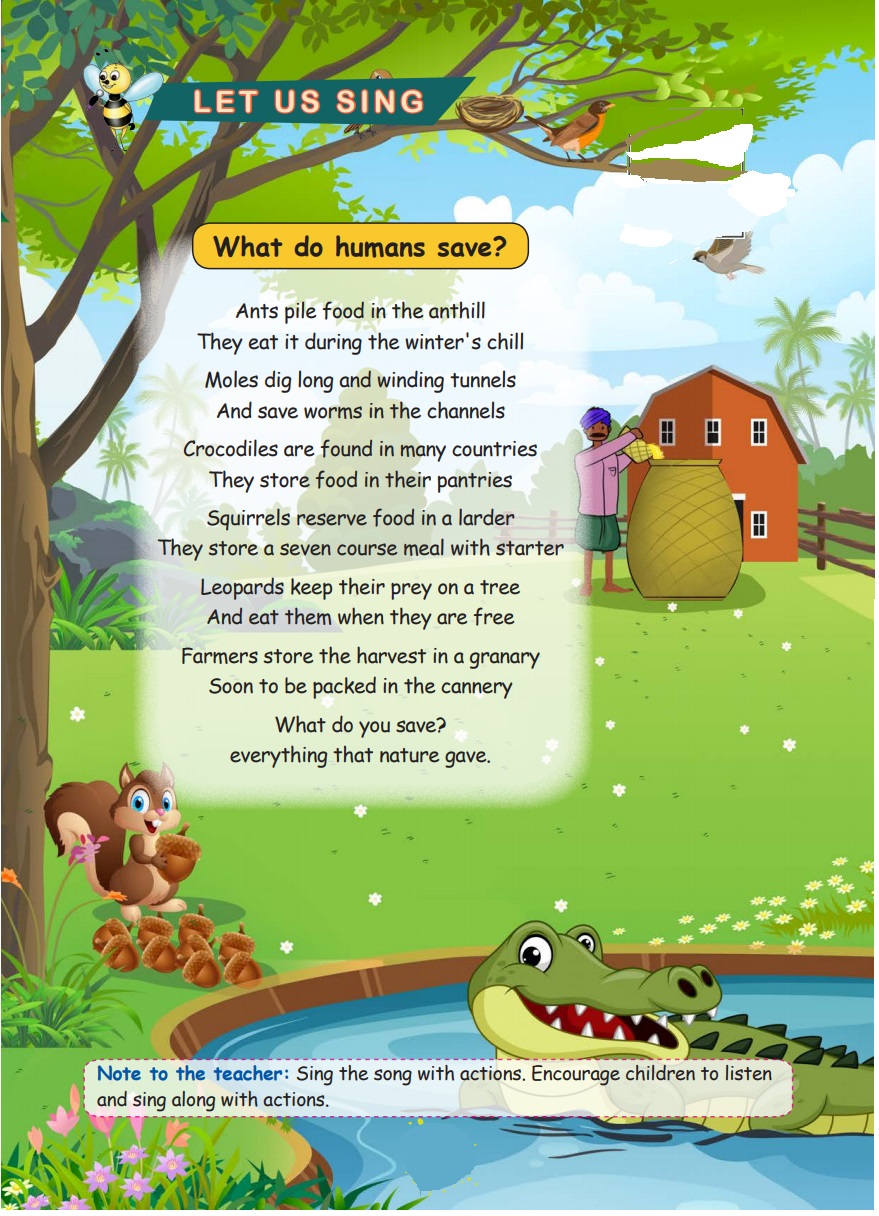
What do humans save?
Ants pile food in the anthill
They eat it during the winter’s chill
Moles dig long and winding tunnels
And save worms in the channels
Crocodiles are found in many countries
They store food in their pantries
Squirrels reserve food in a larder
They store a seven course meal with starter
Leopards keep their prey on a tree
And eat them when they are free
Farmers store the harvest in a granary
Soon to be packed in the cannery
What do you save?
everything that nature gave.
Note to the teacher: Sing the song with actions. Encourage children to listen and sing along with actions.
Glossary
pile: to collect.
pantries: a storage room.
prey: an animal that is hunted and killed by another for food.
granary: a storehouse for threshed grain.
cannery: a place where the food is packed in cans or tins.
A. Match with their storing places.
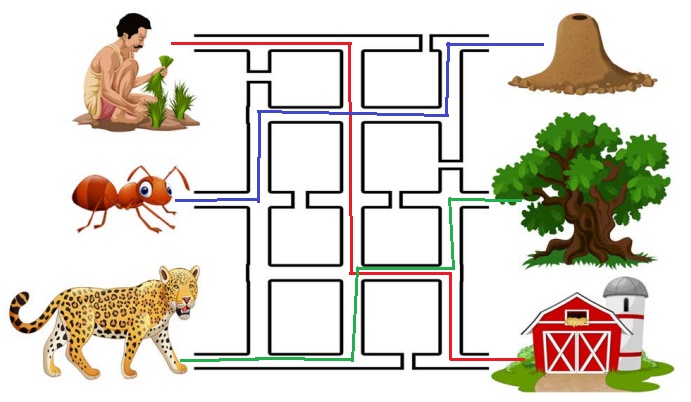
B. Fill in the blanks with rhyming words
1. anthill – chill.
2. tunnels – channels.
3. larder – starter.
4. tree – free.
C. Answer the following questions.
1. Where do ants pile their food?
Ants pile their food in anthills.
2. Where do the crocodiles save?
Crocodiles save food in their pantries.
3. What do you save? Why it is needed?
I save natural resources. It is needed for the use future generations.
LET US KNOW
Past tense
Simple past tense is used to describe an action that has happened. You already know the verb forms they are:

The past form is used in simple past tense. Come let us use it.

I boiled the water.
We boiled the water.
She boiled the water.
You boiled the water.
It (stove) boiled the water.
He boiled the water.
They boiled the water.
We saw simple past tense for action verb. Now let us see the simple past tense for “be” form verbs (state of being)
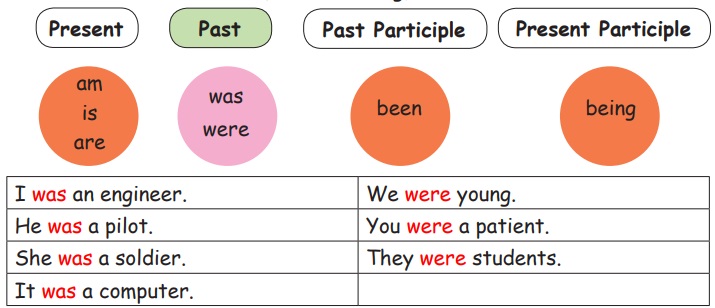
I was an engineer.
He was a pilot.
She was a soldier.
It was a computer.
We were young.
You were a patient.
They were students.
We use the past tense to talk about.
An action that has happened.
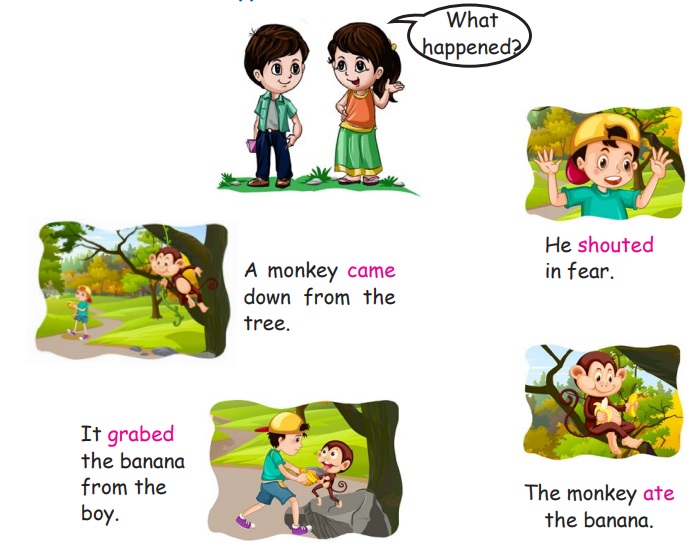
What happened?
A monkey came down from the tree.
He shouted in fear.
It grabed the banana from the boy.
The monkey ate the banana.
Write was or were to complete the sentence.
I was the leader of my class.
Kavi was kind to me.
We were in New York , last week.
The bus was brand new.
You were a baby.
They were friends.
Ragu was my junior in school.
Write the past form of the verbs.
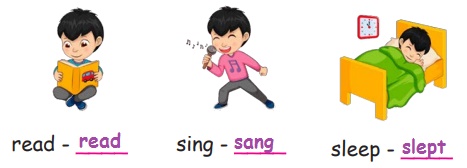
read – read sing – sang sleep – slept
Complete the sentence with the simple past form of the given verbs.
1. It snowed (snow) last winter.
2. The rain continued (continue) all day.
3. I lost (lose) my balance.
4. We stood (stand) for hours.
5. Tom came (come) home from school.
Future tense
Simple future tense refers to an action or event that has not yet happened.

The present form is used in simple future tense with the auxillaries
shall or will. Come let us use it.

In the above example, you can see the verb is in the present form.
The word shall and will are used for I and we.
Will is used for you, they, he, she, it.
We use the simple future tense for actions that yet to happen.
The bus will reach Arcot by the evening.
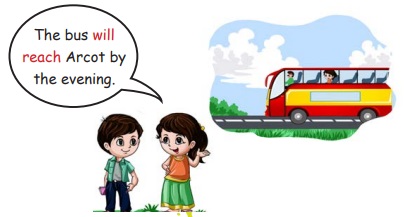
Circle/underline the sentences that is in simple future tense.
1. They washed the van.
2. Kamal will meet you at the shop.
3. My dad helps me read.
4. It will rain tomorrow.
5. He ate many mangoes.
Fill in the blanks with simple future tense of the verb.
1. Sakthi will earn (earn) a lot of money.
2. You will travel (travel) around the world.
3. Everybody will adore (adore) you.
4. Many people will serve (serve) you.
5. They will anticipate (anticipate) your wishes.
LET US LISTEN
Listen to the advertisement and answer the questions given.
1. How many accounts can a parent open at most?
a. 3
b. 2
c. 3
Answer:
2. When does the deposit mature?
a. Both
b. 21 years
c. 14 years
Answer:
3. The minimum deposit for an account is ______.
a. 1000
b. 2000
c. 500
Answer:
4. Income tax exemption given under the section ____.
a. 80C
b. 18C
c. 16A
Answer:
5. The name of the savings scheme is _________.
a. Public Provident Fund
b. Selvamagal
c. Postal Life Insurance
Answer:
Note to the teacher: Scan the QR code to listen to the audio. Let the children listen to the audio and answer the questions.
LET US SPEAK
Learn how they speak in the bank and practise as if you were in that situation.
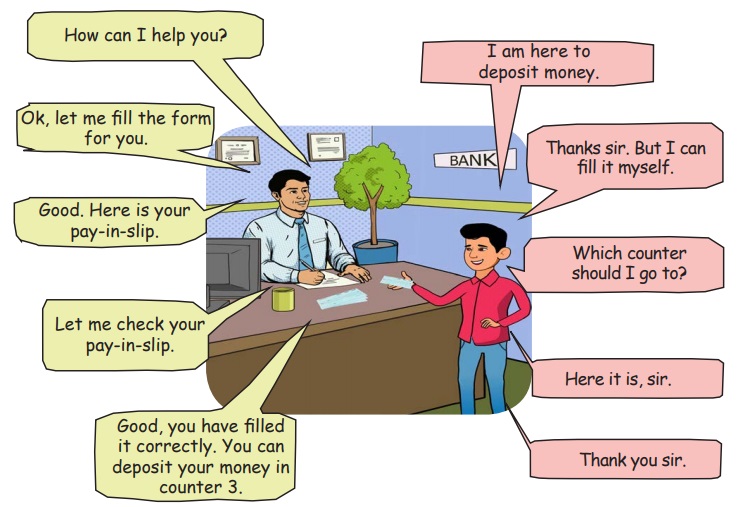
How can I help you?
I am here to deposit money.
Ok, let me fill the form for you.
Thanks sir. But I can fill it myself.
Good. Here is your pay-in-slip.
Which counter should I go to?
Let me check your pay-in-slip.
Here it is, sir.
Good, you have filled it correctly. You can deposit your money in counter 3.
Thank you sir.
Structures that are useful for this situation.
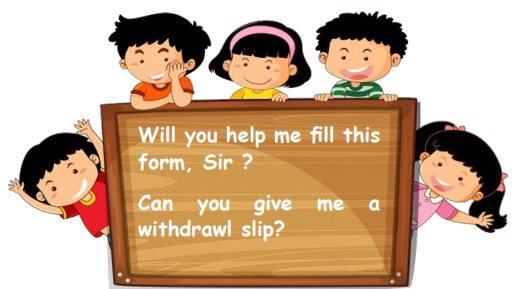
Will you help me fill this form, Sir ?
Can you give me a withdrawl slip?
Note to the teacher: Make the children practise these phrases and give them more scenarios to practise.
LET US READ
Save Wisely
Every year, Kamali and her cousins would visit their grandparents in their native village for the car festival that lasted for three days. The entire village will be in a festive mood. The children were the most excited. The family members and relatives would give the children money to buy sweets and toys. The children would buy toys, chocolates, sweets or packed food items. They would spend all the money, and never saved the money at all. Their grandfather felt that the children should learn to save and use their money wisely. So, this year, he announced that the children should save the money they get over the course of a year, and spend it purposefully.
The children were not at all excited by the announcement. Rajan and Mala were the youngest of the kids. They did not take the grandfather seriously. They spent their money on sweets and toys. The other siblings, Jayan and Kavery, decided to enjoy the festival to the fullest. They bought every single type of food available across the shops.
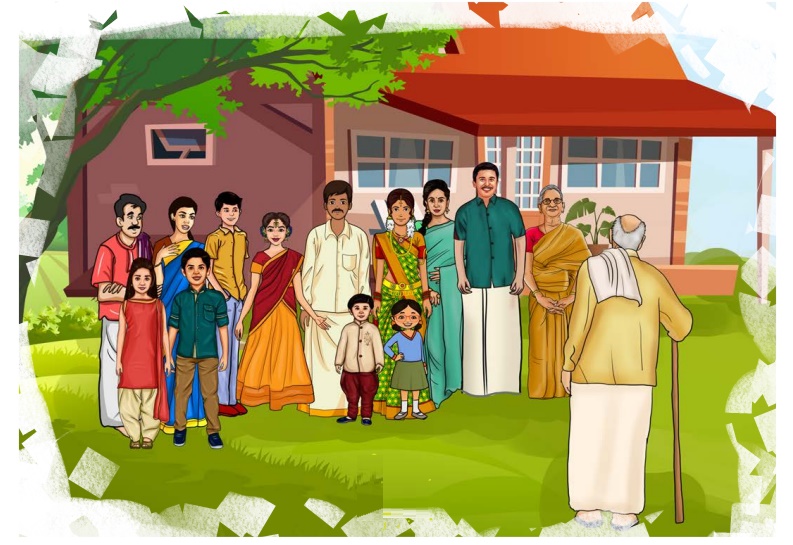
On the second day, Jayan got sick due to food poisoning. So he decided to spend the money only on toys. The eldest of the kids were Kamali and Senthil. They were determined to save the money and use it purposefully. So they controlled their desires and saved every rupee they got.
By the end of the festival, they managed to save around three hundred rupees. Grandfather was so happy to see their effort.
Senthil, when he went home, took his father to the nearest post office and opened a savings account. He saved all his pocket money and found new ways to save money like he started to walk instead of taking the bus. He kept his stationeries safely so that he did not have to keep buying them. He re-used his old books to save money. Soon, his father made him understand that savings is done after using the money for basic needs. So Senthil bought new books to take notes in his class. Senthil’s dream was to buy a camera. At the end of the year, his father checked his savings and bought him the latest camera with his savings!
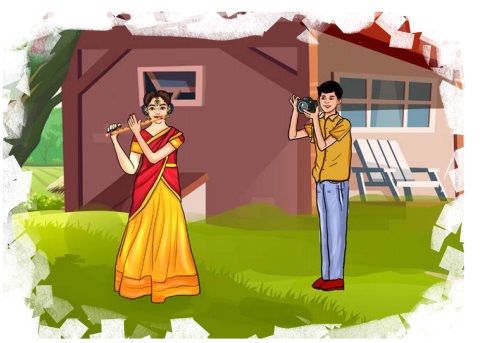
Kamali had a clear plan. She had a friend named Anandhi. Anandhi‛s father was a flutist. They lived in the same street, so the girls used to visit each other often. On many of these occasions, Anandhi used to teach her to play the flute. Kamali always wanted to buy a flute. At the end of one year, she managed to save some amount. At that time, her father needed money urgently and asked if he could use her savings. He promised to return the money soon. Kamali gave her savings to her father. Although she was proud of helping her father, she still wanted to buy the flute. She was disappointed.
Soon it was time to visit the village. Everyone was happy to meet each other after one year. On the day of the car festival, the whole family gathered in the village. Everyone in the family shared about the year gone one by one. After dinner, Senthil brought his new camera and told grandpa how he had saved and bought the camera. Grandpa was very proud and happy. He congratulated him.
Meanwhile, Kamali‛s father gave grandpa a gift and said something in his ears. Grandpa smiled and called Kamali. He gave her the gift. Her savings were used to buy the gift. Kamali eagerly opened the box and found a brand new flute. Her eyes were moist with tears. The whole family asked her to play the flute.
Kamali played a song that her friend had taught her. Senthil started clicking pictures of the event with his camera.
A. Fill in the blanks.
1. Every year the children visit the grand parents in their native village.
2. At the end of the festival , Kamali and senthil saved some money.
3. Savings is done after fulfilling the basic needs.
4. Senthil bought a camera from his savings.
5. Kamali gave her savings to her father.
B. Answer the following questions.
1. What did the children buy with money they have?
Rajan and Mala spent the money on sweets and toys. Jayan and Kavery bought many items of food.
2. What did the grandfather announce?
Grandfather said that the children should save the money and use it purposefully.
3. What happened to Jayan?
Jayan got sick due to food poisoning on the second day.
4. What did Kamali get as gift?
Kamali got a brand new flute as gift.
5. What will you do with your savings?
With my saving I will buy a dictionary.
LET US READ ALOUD
Read the passage three times on your own. Colour a Piggy bank each time you read.
Piggy bank is a coin box used by children. The real use of a piggy bank is to store coins. Piggy banks look like pigs. They come in many shapes and sizes. In Tamil, they are known as Hundial. It is a red, mud pot. We can drop the coins into the pot. Once the pot is full, we must break the pot and use the coins. Start saving with your hundial today!

1. Hundial is an earthen pot. 
2. Mostly piggy banks looks like pigs. 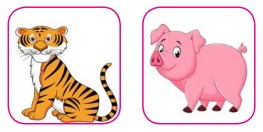
The main idea of the passage is to save
a. to buy a piggy bank.
b. to save .
LET US WRITE
This month you have managed to save Rs. 100 from your pocket money. Fill out the challan to deposit it in your Savings Account at the post office.
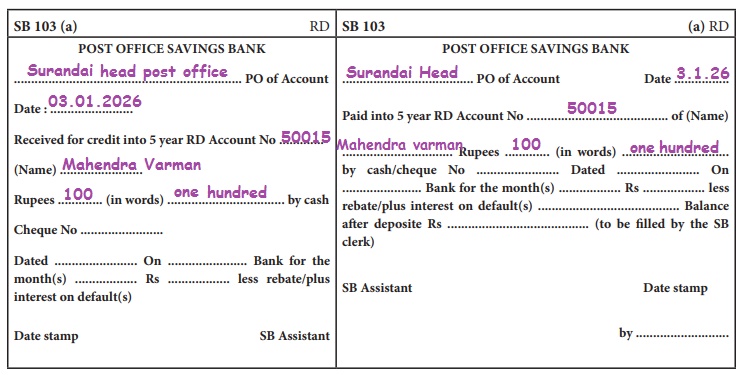
Fill up the withdrawal form to withdraw Rs.200 from your Savings Account.
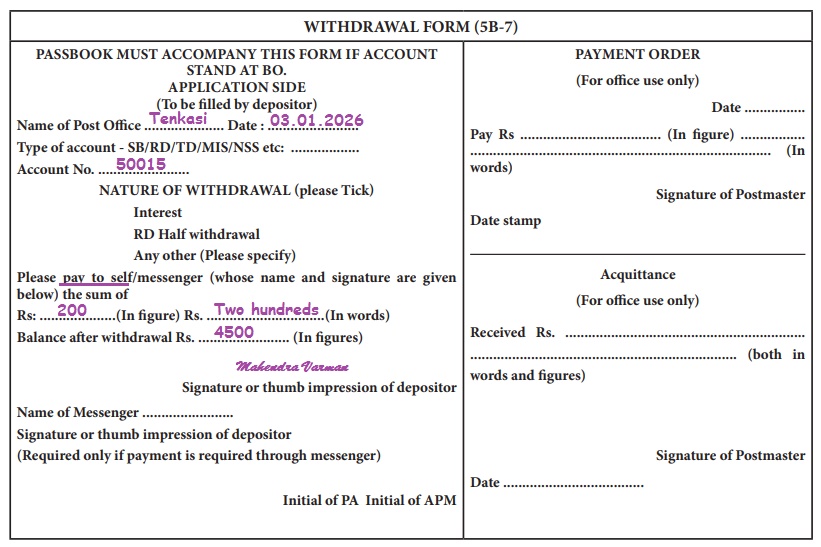
Note to the teacher: Make the children fill more forms for their port folio.
I Can Do
A. Fill in the blanks.
1. Moles dig tunnels to catch worms.
2. Leaf cutter ants drink leaf sap.
3. Kamali gave her savings to her father.
B. Join the word with the correct prefix.
paid send able continue
un dis re pre
Answer: prepaid resend unable discontinue
C. Write the rhyming word.
1. save – gave.
2. countries – pantries.
3. larder – starter.
D. Recite the poem with correct intonation.
E. Write the words given in the bracket in correct tenses.
1. I saw (see) him accidently.
2. We moved (move) back to city yesterday.
3. Rani will meet (meet) Rita tomorrow.
F. Write the past form of the verbs.
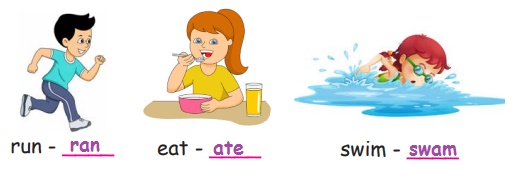
run – ran
eat – ate
swim – swam
Learning Outcome
Now I can…
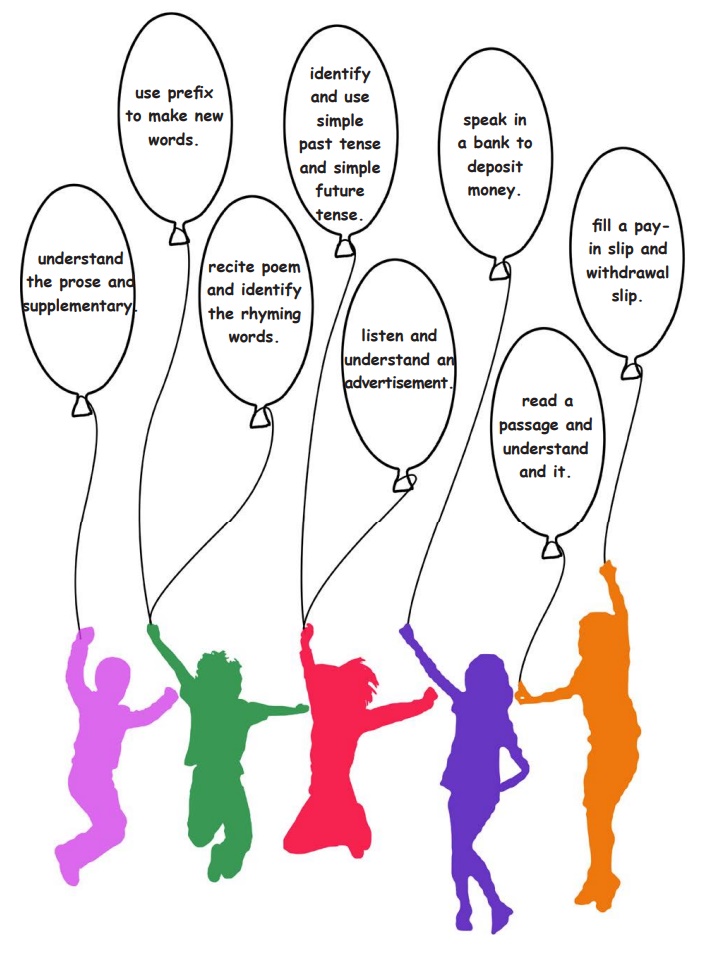
use prefix to make new words.
Identify and use simple past tense and simple future tense.
speak in a bank to deposit money.
fill a pay- in slip and withdrawal slip.
understand the prose and supplementary.
recite poem and identify the rhyming words.
listen and understand an advertisement.
read a passage and understand and it.
Note to the teacher: Ask children to colour the balloon when they achieve the learning outcome.













